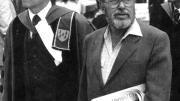Tennessee williams, author of A Streetcar Named Desire and Cat on a Hot Tin Roof, was among 11 people awarded honorary doctoral degrees at Harvard’s Commencement in 1982. Another was Mother Teresa of Calcutta, winner of the Nobel Peace Prize. Robert Kiely, now Loker professor of English emeritus and formerly the master of Adams House for 26 years, until 1999, was Williams’s escort during the academic proceedings. In part two of a memoir of his years as master, just published by the Adams House online alumni magazine, The Gold Coaster, Kiely reveals this observed detail:
“At the honorary degree dinner the night before Commencement, Williams (a short, shy man) was nervous and a bit overwhelmed by Harvard formality, but after dessert and a little wine, when a student group came in to sing, he smiled, relaxed, and taking my hand and that of the elderly lady next to him, said (like one of his characters): ‘I just want to be surrounded by beautiful people.’ The next morning when I met him at Johnston Gate for the procession, he seemed anxious again because he was in a sport jacket, had no academic gown, and felt out of place at Harvard. I tried to reassure him, but he became more tense when we were told to go into Massachusetts Hall where the honorands were to sign a guestbook. Inside the reception room there was a whirl of red gowns and ‘important’ people standing and chatting as if at a Cambridge cocktail party. I thought Williams was about to back out when he and I saw two very small nuns (ignored by everyone) sitting on a couch across the room saying the rosary. ‘My God!’ Williams whispered, grabbing my arm, ‘That’s Mother Teresa!’ I had been on the honorary degree committee and knew she would be there though she had not come to the dinner. Tennessee (he had become ‘Tennessee’ by then) said, ‘Will you introduce me to her?’ I told him that I didn’t know her, but ‘Yes, of course’ that’s what masters are supposed to do: introduce everybody to everybody else. So over we went through the milling crowd of crimson and I—in the strangest introduction I have ever made—said respectfully to the tiny, wrinkled nun, ‘Mother Teresa, this is Tennessee Williams.’ She looked up kindly, obviously having no idea who Tennessee Williams was. And then something extraordinary happened that I am almost positive no one else in the room saw. Tennessee fell to his knees and put his head on her lap. And she patted his head and blessed him. After that and for the rest of the day, he beamed. During the procession, he said to me, ‘Now I know why I came to Harvard.’ (I have always thought that this was a deciding factor in his leaving some of his papers to Houghton Library.)”
![]()
Why he didn’t come: Writer Gore Vidal, who died last July, managed to become a “gentleman bitch,” as he called himself, without the ordeal of going to college. I Told You So: Gore Vidal Talks Politics, published in November by OR Books, is a collection of interviews of Vidal by historian and radio host Jon Wiener, Ph.D. ’72. Wiener asked Vidal why he didn’t go to college.
“I graduated from Exeter,” Vidal explained, “and I was aimed at going to Harvard. Instead I enlisted in [the navy] in 1943. When I got out in ’46, I thought, ‘I’ve spent all my life in institutions that I loathe, including my service in the [navy] of the United States.’ I thought, ‘Shall I go for another four years?’
“My first book was already being published. I said, ‘I’m going to be told how to write by somebody at Harvard.…This is too great a risk.’”
“But I did go there to lecture,” Vidal continued. “This was about ’47 or ’48. There was a big audience, and many of them were my classmates from Exeter, who were overage juniors and seniors….I came out cheerily, as is my wont, and I’ve never felt such hatred radiating. They’d all predicted my total failure, because I was not to go to Harvard and meet a publisher or an agent—which is, I think, why they went.”
Although he wouldn’t start at Harvard, Vidal ended there; all his papers are at Houghton.









